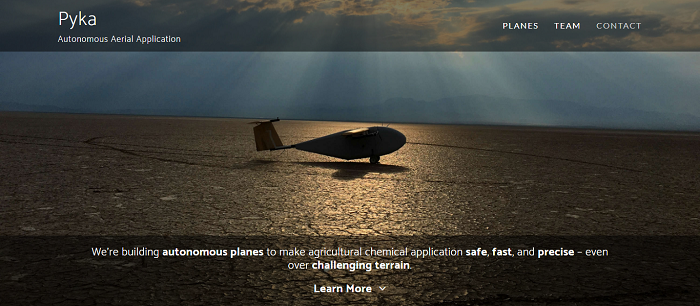It’s common to use pesticides in agriculture industry to fight insects and other organisms harmful for the plants. However, applying such pesticides or chemicals has its own challenges. The most important challenge is to ensure that chemicals are only applied within the target area so that other plants, stocks, animals and humans outside the target area remain safe. Wind and drift add more complexities to this challenge. Aerial application is also used to spray chemicals in a better way and it also helps to spray on areas like hills and other terrains where manual application is difficult. But, most of the aerial application is controlled by humans whether they fly planes by themselves or control it remotely so there is a margin of error.
To address this problem and minimize margin of error, there should be self-flying planes that can apply chemicals by themselves without human involvement.

We present Pyka, our new portfolio startup flying autonomously straight through YCombinator’s Summer 2017 batch to help agriculture industry by applying chemicals on any type of target area safely, quickly and in an affordable manner.
Applying chemicals requires flying planes close to the surface which is a dangerous type of flying. Since Pyka planes self-fly so pilot can stay on the ground while Pyka does the job. Pyka airplanes make use of special sensors and controllers to not just fly automatically but also to detect that what is the right timing and path for spraying on the target areas so that it can compensate with the wind and reduce the drift. This also brings additional benefits like less usage of chemicals and minimized exposure to harmful chemicals. Another benefit of using Pyka airplanes is the speed. Since planes can fly up to 70 miles per hour so all types of areas can be covered quickly. Overall, reduced application time and chemical usage makes aerial application an affordable option even for smaller farms. Pyka is already providing aerial application services in New Zealand farms for $600 per hour.
Pyka as flying taxi
Besides serving agriculture industry, Pyka also has great ambitions to offer human transportation using its self-flying airplanes as flying taxis. Even the airplane presented by Pyka on YCombinator’s Demo Day also had the support of carrying one person. On a similar note, you might have heard of Ehang184, a rechargeable self-driving drone that can also carry a person with his bag and travel for about 31 miles so flying taxis are a reality. Unlike Ehang184, Pyka airplane is not a drone. It’s autonomous, can take off and land in just 90 feet.
Even having the abilities of a single person self-flying taxi, Pyka is still serving only agriculture industry at the moment because the regulatory authorities have to inspect and test Pyka airplanes thoroughly before giving them a go ahead to have humans on board. Once approved, you would be able to use Pyka’s airplanes as flying taxis too.
If you want to use Pyka for chemical application on your farms or know more about their flying taxi ambitions, feel free to contact them.


